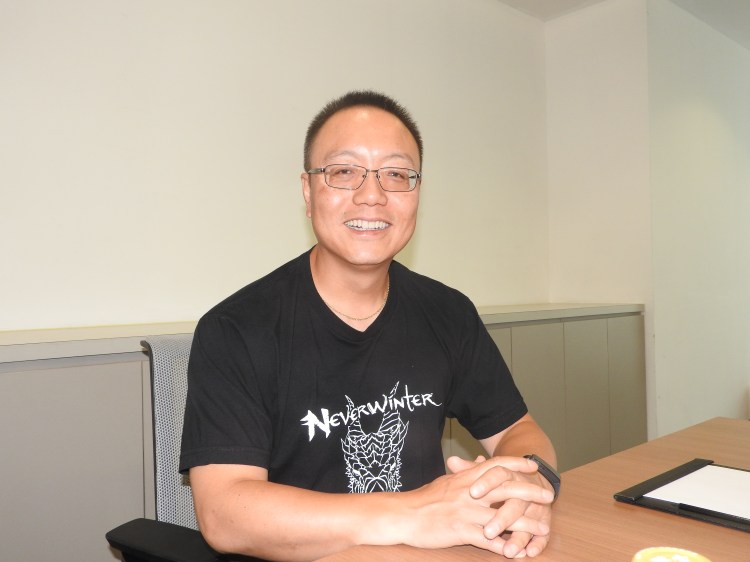Disclosure: The organizers of ChinaJoy paid my way to Shanghai. Our coverage remains objective.
SHANGHAI — Robert Xiao, chief executive of Perfect World, made bets last year on the launch of Microsoft’s Xbox One and Sony’s PlayStation 4 game consoles in China. Those consoles didn’t do as well as expected, but Xiao said in an interview with GamesBeat at the ChinaJoy game trade show in Shanghai last week that he is still optimistic about the long-term success for the machines.
Xiao’s opinion matters. While there are more than 100 online game companies operating in China, Beijing-based Perfect World is a big one. In 2014, Perfect World reported net income of $73.5 million on revenues of $619.4 million. The company has more than 5,000 employees, and its success is built online game worlds such as Perfect World and the recently launched Neverwinter title from Perfect World’s U.S. subsidiary, Cryptic Studios.
Perfect World has been expanding into mobile in the past few years, and it has seen success with titles such as Return of the Condor Heroes Mobile, Legend of Chu and Han, and Cross Gate. The company was founded in 2004, and it went public in 2007. The company isn’t as well known in the West. But it is very well known in China. It won an award for being one of the top 10 influential Asian brands at the Asia Brand Ceremony.
Here’s an edited transcript of our interview.
GamesBeat: I heard the deputy director’s talk (by Song Jianxin) about the Chinese government encouraging Chinese game companies to go worldwide and be global. It looks like you’ve been following that strategy for a while. Where do you feel the Chinese game industry at large is at on that score?
Robert Xiao: In the past 10 years, if you compare—I always say you have to look at the industry in two dimensions. One is vertical, or historical. The other is more latitude-wise, comparing at certain times different portions of the market. If you look at a vertical comparison between 10 years ago and now, China has changed to so much. The progress in globalization is speeding up. 10 years ago we exported what was probably the first major game from China to the world. Now there are so many companies that are able to export their games.
We’ve been able to stay a few steps ahead, setting up our studios and publishing capability globally. We’ve acquired and invested in local capacity to develop mainstream games abroad, like Neverwinter. It’s locally developed in North America. The primary target market is North America. This trend will continue in the next 10 years. More and more high-quality Chinese games and Chinese publishers and Chinese capital will spread out across the world to engage in global competition and market expansion.
Latitude-wise, 10 years ago Chinese game development and the Chinese game market—Compared to North America, you might say it was about 100 miles away. Now we’re more like 20 miles away. Still lagging behind, but we’re doing a lot of catch-up. In the next 10 years some Chinese companies will be able – quality-wise, resource-wise – to get into to real global competition.
GamesBeat: Do you feel you already have good global brand recognition?
Xiao: We have some. Perfect World is a recognized brand in many markets. But the brand is supported by products – not only Chinese products, but also locally-developed products, like Torchlight, Neverwinter, and STO. STO wasn’t developed by us, but we came up with a way to change the monetization and make it free-to-play. It was a collaboration between Cryptic and our Chinese studios to come up with a good business that fits into the American market. We feel like we’re making progress.
GamesBeat: Last year we talked about the beginnings of your move into mobile. How is that going?
Xiao: It’s doing well. We’re the third- or fourth-largest publisher in China now in mobile. We’ve developed several games in house that have landed in the top 10. We’re a recognized producer of mobile games in China.


